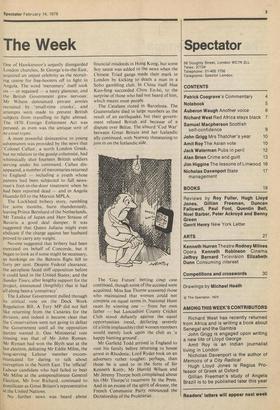The Week
One of Hawksmoor's unjustly disregarded London churches, St George's-in-the-East, acquired an unjust celebrity as the recruiting centre for free-booters off to fight in Angola. The word 'mercenary' itself took on — or regained — a nasty glamour, and the British Government grew nervous: Mr Wilson denounced private armies recruited by 'small-time crooks', and attempts were made to prevent British subjects from travelling to fight abroad. The 1870 Foreign Enlistment Act was perused, as even was the antique writ of
ne exeat rem).
A more powerful disincentive to young adventurers was provided by the news that 'Colonel Callan', a north London Greek, but no relation to the gossip columnist, had whimsically shot fourteen British soldiers serving under his command. Callan dis appeared, a number of mercenaries returned to England — including a youth whose parents had been subjected to full newsman's foot-in-the-door treatment when he had been reported dead — and in Angola Huando fell to the Marxist MPLA.
The Lockheed bribery story, rumbling for some months, burst thunderously, leaving Prince Bernhard of the Netherlands, Mr Tanaka of Japan and Herr Strauss of Bavaria a good deal damper. It was suggested that Queen Juliana might even abdicate if the charge against her husband proved to carry any weight.
No-one suggested that bribery had been exercised on behalf of Concorde, but it began to look as if some might be necessary, as bookings on the Bahrein flight fell to forty per cent. Despite Federal clearance,
the aeroplane faced stiff opposition before it could land in the United States; and the Sunday Times, after lengthy support for the project, announced (lengthily) that it had all along been a 'conspiracy'.
The Labour Government pulled through its critical vote on the Dock Work Regulation Bill. A Tory MP did not feel like returning from the Canaries for the division, and indeed it became clear that the Conservatives were not going to defeat the Government until all the opposition Parties wanted it. One Ministerial vote Missing was that of Mr John Ryman. Mr Ryman had won the Blyth seat at the last election, defeating Mr Eddie Milne, the long-serving Labour member excomMunicated for daring to talk about corruption in the North East. The 'official' Labour candidate who had failed to beat Mr Milne at the antepenultimate General Election, Mr Ivor Richard, continued to Pontificate as Great Britain's representative at the United Nations.
No further news was heard about financial misdeeds in Hong Kong, but some Soy sauce was added to the news when the Chinese Triad gangs made their mark in London by kicking to death a man in a Soho gambling club. In China itself Hua Kuo-feng succeeded Chou En-lai, to the surprise of those who had not heard of him, which meant most people.
The Catalans rioted in Barcelona. The Guatemalans died in large numbers as the result of an earthquake, but their government refused British aid because of a dispute over Belize. The absurd 'Cod War' between Great Britain and her Icelandic ally continued, with Norway threatening to join in on the Icelandic side.
The 'Gay Future' betting coup case continued, though some of the accused were acquitted. Miss Sue Thorne answered those who maintained that women could not compete on equal terms in National Hunt races by winning one — from her own father — but Lancashire County Cricket Club stood defiantly against the equal opportunities trend, declaring severely (if a little implausibly) that women members would merely look upon the club as 'a happy hunting ground'.
Mr Garfield Todd arrived in England to visit his family before returning to house arrest in Rhodesia; Lord Ryder took on an adversary rather tougher, perhaps, than those he is used to in the form of Sir Kenneth Keith; Mr Harold Wilson and Mr Jeremy Thorpe both complained about his (Mr Thorpe's) treatment by the Press. And in an excess of the spirit of detente, the French Communist Party renounced the Dictatorship of the Proletariat.


































 Previous page
Previous page